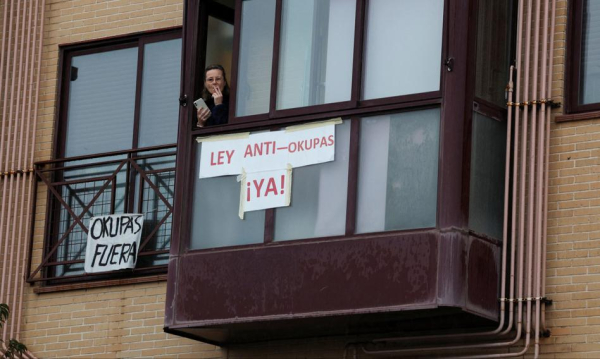The first company to remove squatters, the so-called ‘occupas’, began operating in Lisbon. An example came from Spain, where the occupation of other people’s apartments, including by immigrants, became a serious social problem, and the owners – in the face of the helplessness of the courts – took matters into their own hands.

According to Portuguese radio Observador, ads for the Anti Okupas Group, a Spanish company that is trying to evict non-paying tenants from several properties in and around Lisbon, began circulating on social media in early May. Earlier this year, in February, the “okupas” case was brought to the fore by André Ventura, leader of the right-wing, anti-immigration Chega party. Ventura thundered on Facebook that the “invasion” of the Okupas in Portugal “will not pass.” Chega won record votes in Sunday’s elections, coming in second place, tied with the Socialists. In the south of the country, which has previously voted for the Socialists and Communists, Chega won.
Anti Okupas is one of many Spanish companies specializing in removing unwanted tenants (known as “okupas”) from illegally occupied properties. At the request of the owners, Anti Okupas Group also evicts non-paying tenants (Spanish: inquiokupas). The company has branches in Andalusia, Valencia, Barcelona, Madrid, Galicia and the Balearic Islands, among others, and is guided by the slogan “if the law does not act, we do.”
According to the Anti Okupas Group website, its aim is to “provide specialist services in the fast and efficient eviction of illegal occupiers in order to protect clients’ property.” The company has been operating in Spain for five years and boasts of having “recovered” 3,800 properties there.
“Okupas” is a Spanish term referring to squatters who illegally occupy other people’s properties. In the 1980s, the phenomenon of appropriating other people’s homes – “because they were empty” – was a reaction in Spain to the housing shortage and property speculation, especially in large cities, where rental and sale prices were skyrocketing. However, since 2018, when leftist governments began introducing regulations under the so-called ley kupas, making it almost impossible to quickly evict squatters, the number of cases of illegal appropriation of property has started to grow and arouse increasing public opposition.
As reported by infobae.com, among others, although the law specified eviction procedures, they were long and complicated in Spain. The basic problem for Spanish owners was the ban on evicting a squatter without prior legal proceedings. Until the case was resolved in court, the “okupas” were therefore protected and could continue to live, for example, in a luxury apartment into which they had illegally moved. Okupas cases usually dragged on for months.
Companies such as Anti Okupas Group or Okupas Fuera, offering lawful property owners the quick eviction of squatters, have appeared in Spain in response to the helplessness of the courts and police. Their methods, however, may raise doubts.
Anti Okupas claims in its advertising materials that it always complies with the law, but videos published by itself, e.g. on Tiktok, show that unwanted tenants are often knocked to the ground and handcuffed by its employees. One of the videos available online shows, for example, two men in T-shirts with the inscription Antiokupas talking through a door with a tenant, then breaking it down and threatening to throw him out the window.
According to information from the daily “Público”, the Portuguese prosecutor’s office is already investigating the activities of the Spanish company and claims that such activity is a crime in Portugal.
In Spain, legal attempts have recently been made to combat occupancies. In April of this year, a new law came into force that aims to speed up legal proceedings in cases of trespass and home invasions. Court cases should now take no longer than 15 days. Under the amendment to the Penal Code, burglary (Spanish: allanamiento de morada), which is the illegal occupation of a home that is the permanent residence of a person, or usurpation (Spanish: usurpación), which is the illegal occupation of a home that is not the permanent residence of the owner, now carries a sentence of up to three years in prison. In the case of a break-in on private property, the police can also take immediate action. If the property has been occupied for less than 48 hours, even express eviction is possible.
However, the problem of “okupas” is so acute in Spain that you can even insure yourself against this phenomenon with reputable insurance companies.
According to a study prepared and published by the Property Rights Alliance, in terms of the protection of private property, Spain is only in 22nd place out of 37 countries analyzed. According to data from the Spanish Ministry of the Interior, in the last few years the total number of cases of usurpation of other people’s properties has increased dramatically: from 1,548 in 2018 to 9,459 recorded in 2023. According to the same source, the number of foreign squatters has also increased during the same period: from 29% in 2018 to the majority in 2023.
According to the portal infobae.com, mafias are already operating in Spain, organising illegal occupation of real estate in large cities and then collecting tribute from the owners. (PAP)
ag/ dec/ lm/